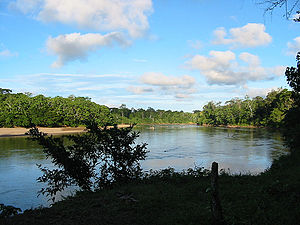





Tío Jorge
As he stood on the deck leaning on the rail of a large cargo ship from England to South America, a thick fog hid the pier and the air was chilly. Where was the Lord taking him and what lay ahead? His possession consisted of a Bible, the clothes on his back and an empty money pouch.
Having been a geologist and teacher, he now felt driven to serve the Lord no matter what was involved. While teaching he was also studying and earned a doctorate in Geology at London University. In his leisure time he read about remote and backward places and wondered why more people did not go to South America, especially Ecuador, which is among the most backward nations of the world, to tell the people about Jesus.
So, resigning his position, he sold his car. On the money thus gained he studied a condensed course in medicine for a year, then set off for Ecuador as a missionary to bring the biblical Gospel to primitive persons living in the vast Amazon region. He knew that he had a gift for learning new languages easily which would help. He found a freighter tied up at the wharf bound for South America and climbed aboard. In the cabin he asked if passage was available. Yes, they could take him – for the sum of a pound. After settling his financial affairs there was just one pound left. Without hesitation he handed it over. It was all the money he had in the world but he was confident that the Lord would take care of everything.
Now, leaning over the rail outside, he heard someone calling his name. Out of the darkness and swirling fog, a figure appeared on the wharf an arm reached up. In the hand was a one pound note! Not a word was spoken as the money changed hands. The figure disappeared. “Now I know the Lord is with me,” he thought.
It was a long, difficult passage that time of the year and the rocking of the ship in tumultuous seas made him very sick. Constant prayer and Scripture came to his aid. The passage about Jesus walking on the water to the tiny boat tossing about in the stormy Sea of Galilee to comfort those who were His, removed the fear.
Finally, as the freighter approached the harbor, there was a problem and they had to dock some distance south of the city to unload. It was then he learned that the cargo consisted of dangerous explosives.
In 1950 and the next few years, he worked his way into the great Amazon jungle of Ecuador to a place in the Curaray River area. Here he built a little hut, became friendly with the natives, learned their Quechua language and taught them about the Lord. Many became Believers. Along the way he met and married a lady of the Plymouth Brethren orientation like himself, who was also motivated to bring the Gospel to the Indians.
He has now been in the country for six years, living among the Indians, compiling a really good Quechua vocabulary and learning to speak that language fluently. His time has been spent doing mission work, learning the customs, traditions and character of the people – except the notorious Aucas, about whom no one really knew anything. They were some distance away. The Aucas were fierce and resisted any intrusion into their territory. They loved killing ran the legend, and never took captives, but no one knew how they lived, or even what they looked like except they were unclothed. No one knew their language.
Then there began to stir an unbelievable rumor concerning a girl name Joaquina, belonging to the Jumbo tribe, who had been taken captive by the Aucas. She finally escaped and stilled lived. If it was true, could someone be found who could communicate with the girl and learn the Auca language? She had been with the Aucas for fourteen months and was about fifteen years old.
Our missionary was in Quito at the time and after a quick conference with the manager of the Shell Oil company, he was off by car, airplane and canoe (all provided courtesy of Shell) to the Jumbo Village where the escaped girl was back home. Since he spoke Quechua perfectly, knew the girl’s family and was even acquainted with Joaquina, she would not be afraid to tell him all she remembered and would help him learn the Auca language and their customs.
It is a very primitive tongue and with her help he was able to produce a written phonetic Auca dictionary. He learned that they have no words for abstractions and have no conception of, or words, for heaven or hell. They do, however, acknowledge a supreme being whose name is Wanka.
Meanwhile, an American missionary, Nate Saint, and four other young missionaries, Jim Eliot, Ed Mc Cully, Peter Fleming and Roger Youderian, had set out in their seaplane to work among the Aucas. The men’s plan was to locate themselves in an old oil station named Shell Mera that was abandoned because it was considered too dangerous for oil personnel because of the Aucas. It was close to their tribe and has a small airstrip. Meanwhile our missionary had to travel to the United States because of his wife’s poor health. When he returned, he helped them with their preparations and taught them some of the Auca language and customs.
The Aucas didn’t like having a foreign missionary so near and decided to get rid of him. But the Lord had other plans. Our brother had a bad accident and injured his leg. He had to leave to get medical help. After his injury was treated he returned “home” and found his walls and door full of Auca spears. The Aucas had arrived while he was gone, and frustrated at not finding him, they had done the only thing they could think of to vent their anger before returning to their own neighborhood.
Then the fateful day arrived, and you know the rest. On Sunday, January 8, 1956, the entire team was killed on the beach when armed Aucas meet them as they were about to take off in their plane.